2017 Santa Cruz Hightower Carbon C S 29
(discontinued)
| Where To Buy | |||
|---|---|---|---|
Free shipping on orders over $50 (continental U.S. only).
International shipping available. Some exclusions apply. |
Free shipping on orders over $50 (continental U.S. only).
International shipping available. Some exclusions apply. $4,999.00
|
||
Free shipping on orders over $50 (continental U.S. only).
International shipping available. Some exclusions apply. |
Free shipping on orders over $50 (continental U.S. only).
International shipping available. Some exclusions apply. $7,999.00
|
||

Santa Cruz’s Hightower was just released a year ago, benefiting from the company's continued refinement of the VPP suspension system. It combines 135mm of travel with 29-inch or 27.5+ wheels to create a bike that can take on a wide variety of terrain while keeping up speed and staying as efficient as possible. With the most travel of any 29/27.5+ bike in their lineup, the Hightower is more than just an efficiency sled with some travel – it is truly a do-it-all bike. Santa Cruz has some of the most trusted carbon frames in the business and relatively affordable pricing on some models as well. By adding updates like Boost axle spacing and clean cable routing, they've made one of the most lusted after bikes in the company’s line. Numbers and features don’t mean everything though, so we took the Hightower out to see what all of the modifications and recent improvements mean in the real world during the 2017 Vital MTB Test Sessions.
Highlights
- Full carbon frame
- 29-inch wheels, 27.5+ compatible
- 135mm (5.3-inches) of rear wheel travel // 140mm (5.5-inches) fork travel
- VPP suspension design
- Tapered headtube
- Internal cable routing
- Double sealed bearings
- Accepts piggyback shocks without losing use of bottle cage mounts
- 73mm threaded bottom bracket shell with ISCG05 mounts
- Boost 148mm rear spacing with 12mm through axle
- Measured weight (size medium, no pedals): 29.9-pounds (13.57kg)
- MSRP $4,599 USD
Santa Cruz frames have all seen quite a bit of refinement in recent years. Sure, they have more models than many to cover any sort of mountain biking you could want, but most have evolved from the earliest versions of the Nomad, Blur, and V10. We appreciate refinement, and the Hightower is essentially an updated Tallboy LT that makes use of a similar third-generation VPP suspension design to the one found on the Nomad and new Bronson. As we wrote when the bike was first launched, this design was used in order to make the bike adjustable and maintain a short chainstay, which required removing the front derailleur mount. Once the front derailleur was removed, the ability to run the twin upright swingarm was possible and came with an added stiffness benefit. Santa Cruz paired the VPP design with a 200x51mm RockShox Monarch RT rear shock on the "S" build kit we tested.

A lot of things are not necessarily new to the industry on the Hightower, but they do provide awesome benefits to riders. Moving to Boost axle spacing creates a wider spoke bracing angle and in turn provides a stiffer wheel, in effect improving the ride quality and responsiveness of wagon wheels without the need to throw down big bucks for carbon hoops. At the same time, the added width makes it possible to have plenty of clearance for a plus-sized wheel, and Santa Cruz have gone the extra mile to optimize the performance of both wheel sizes within one frame.
The ability to choose either 27.5+ or 29-inch wheels on the Hightower leaves many riders with the chance to choose either the fastest rolling option or opt for a little more cushion. There's room for up to 27.5x3.0-inch tires with a low profile tread, though most plus-size users will prefer a 2.8-inch tire. We tested the bike exclusively with 29-inch wheels for this review, and with the stock 29x2.3-inch tires there is decent mud clearance with ~1cm of room for the muck at the tightest spot.
Santa Cruz continues their firmly held tradition of using standard 73mm threaded bottom brackets, something your mechanic will rejoice over as it's often more silent than the Press Fit alternative. They've also held on to the rear IS brake mount over the post mount alternative. Internal cable routing is employed in routing of the stealth seatpost and shifter cable, but avoided on the rear brake where it's less practical. Cables run through tubes to make routing easier and rattle-free. You'll be pleased to find a bottle mount inside the front triangle, as well as molded rubber downtube and chainstay protectors.
|
|
|
|
The bike is made in two carbon versions – Carbon C and Carbon CC. According to Santa Cruz, "By using a slightly-less-expensive carbon fiber, we were able to put performance within reach of more riders than ever before. The stiffness, durability, and strength are identical between the two materials, but the C-level carbon weighs in at about 230 grams more than the top-end CC carbon."
Opting for the high value option, we tested the $4,599 Hightower C S model. There's a more affordable version at $3,599 as well, and those looking for the best performance will find a bike and components to suit their needs in the CC range that spans from $6,599 to $7,999 with the option for ENVE wheels at an added charge. It's also possible to build up a $2,999 Hightower CC frame with a RockShox Monarch RT3 rear shock.
Geometry

The Hightower has a flip chip in the rear shock mount that allows the rider to choose from two geometry settings. This was designed "to maintain the frame's geometry when swapping between standard 29-inch tires and 27.5+ tires. The 'Low' setting is designed for 29er use, and the 'High' setting for 27.5+. While 27.5+ tires have a diameter that's similar to the 29er tire, it's not quite equal, so reversing the chip is a must to maintain the handling characteristics."
Of course it's also possible to use the geometry adjustment without swapping wheels. "Flipping the chip to 'High' without swapping to 27.5+ tires results in an increase of 3.1mm to bottom bracket height, and an increase of 0.25-degrees to your head and seat angles." Those riding in really rocky climbing situations might appreciate the extra boost in bottom bracket height.
A 140mm fork comes standard on the 29-inch kits and is exchanged for a 150mm version on the 27.5+ builds to keep the head angle consistent.
The geometry shown is with 29-inch wheels, a 140mm fork, and the 'Low' flip chip position. In this configuration, our size medium test bike sported a comfortably slack 67-degree head angle, upright 74.3-degree effective seat tube angle, snug 435mm chainstays, 430mm reach, and a consistent measured bottom bracket height of 338mm. Since the bike's launch they've added sizes small and XXL, expanding the number of riders who can enjoy the Hightower.
Riders looking to make the bike more capable can run a 150mm fork with 29-inch wheels, resulting in a bottom bracket height increase of 3.4mm and 0.4-degree slacker head and seat angles.
Suspension Analysis
Using the bike industry's leading linkage analysis software, André Santos, the Youtube suspension whiz, was able to determine a close approximation of the Hightower's kinematics for the purpose of this review. These charts provide great insight into several key factors that impact how it rides. Those unfamiliar with these types of graphs should watch André's excellent series of suspension fundamentals videos. The results of his analysis are as follows:
|
|
|
|
Observations:
- The Santa Cruz Hightower is slightly progressive trail bike at 13%.
- It has good pedaling efficiency for a single-ring setup with anti-squat values close to 90% on a 32-tooth chainring, and close to 100% on a 30-tooth chainring. The anti-squat profile is excellent with very stable values across the pedaling zone.
- The anti-squat values drop at the end of the travel reducing the amount of total kickback.
- Anti-rise of 70% at sag, meaning that the geometry of the bike is well preserved under braking.
- Overall, the Hightower is a slightly progressive trail bike with great pedaling characteristics.
How does science meet the dirt? Did our real life ride time confirm the analysis? It's back to Vital's testers to hear how the Hightower performed on trail.
On The Trail
Given the large wheels and do-it-all geometry, we took the Hightower on some of the biggest rides we could. We did a large part of Tucson, Arizona's famous Lemmon Drop – a multi-hour adventure covering several types of trails and soil types – to test all we could. From tacky dirt, snow, and loam up top to rough, loose, and rocky desert down low, the Hightower saw a solid mixture of terrain. We even piloted it down the ultra-rough La Milagrosa trail to see just how ready it is to tackle the wildest of situations.
Santa Cruz recommends 15-18mm (29-35%) of rear shock sag, and we started our test near the 30% mark. We liked the feel of the cockpit on our size medium test bike, striking a good balance and reach for our 5’8” and 5’10” (1.73 and 1.78m) tall testers. Santa Cruz did a decent job of choosing the components as well. The 760mm Race Face Ride Lo-Rise bar is wide enough to suit most riders' needs, especially when combined with Santa Cruz's grips that add a bit of width, though we'd prefer something with some rise given the short headtube height. The 50mm Race Face Turbine Basic stem is also right in line with many aggressive setups that are in demand right now.
Riding the Hightower back-to-back with the YT Jeffsy 29 exposed differences in both bikes, with the Hightower having a much mushier suspension feel a slower-feeling response when pushing into the travel. For the same amount of effort the YT seemed to outpace the Santa Cruz, though the YT required the rider to be alert and "on it" at all times. Riding casually, the Hightower provided a more comfortable ride. If you enjoy the Santa Cruz VPP suspension feel, a little more travel, and 29-inch wheels you'll enjoy this ride. Those looking for a play bike will find more enjoyment in the 5010.

One thing that really stands out about the Hightower is that it has a calmer sense to it than comparable bikes, and this works well through sustained chatter. There are some tricky lines to get into on Tucson's trails that require you to corner a little harder and be in a little bit more control, and the Hightower was able to provide in these situations. We were impressed by its ability to nail a line, and think the excellent tire selection helped a good deal.
Our only issue came when we were really trying to get after it on the steepest, roughest sections of trail. The Hightower doesn't feel as confidence inspiring as other bikes in a similar travel range.
What about riding the bike with plus tires? Though we weren't able to do so this time, our First Ride feature covered it well. While riding in Chile we noted the bike has a notably lower bottom bracket height with the larger width tires installed, which in turn led to spiking cranks more often in rocky terrain. Traction was phenomenal, though, and at slower speeds helped to create an even more comfortable ride. Despite all of this traction, the lack of a defined side-knob or edge to the tire is something we miss on plus-sized wheels. Cornering can be a little vague, and generally we find ourselves putting faith in the extra traction purely because of the amount of surface area/rubber rolling on the ground beneath us. There is no “aha” moment where you feel the edge of the tire bite into the terrain and begin to churn up the dirt. To be honest, for us, that's one of the best feelings when riding a mountain bike.
Build Kit
From the get-go we noted the presence of several name-brand parts on the Hightower. Our $4,599 build kit is on the more affordable end of the bikes we tested at this year's Test Sessions, though still a good chunk of change. In areas that most companies put house-brand components – like bars, stems, seats, grips, even dropper posts and hubs in many instances – it's refreshing to see Race Face, WTB, RockShox and Novatec coming standard on the Hightower. Are all these things necessarily better or worse? No, but it still makes us feel like it is a good bike for the money, and we like that when it comes time to pull the trigger on a new ride.
|
|
|
|
Santa Cruz is well aware of the need for longer travel dropper posts, and all sizes sport increased length RockShox Reverb Stealth posts compared to what you'd find standard just a few years ago. Our size medium had 150mm of drop. We appreciated the positioning of the remote under the left side of the bar.
Over the years we’ve spent lots of time on the RockShox Pike, though most of that time has been on the RCT3 version with a bit more adjustability than the RC. The Pike RC still has very good off-the-top feel and the same chassis as the higher-end version. What's different is the ability to change how the fork goes through its travel. While the Pike RC has adjustable compression, we couldn’t quite get it to feel as good as we’ve become accustomed to. We still had good air spring tunability with Bottomless Tokens and front end stiffness to match the back of the bike. Adding a volume spacer up front helped the overall attitude of the bike.
The stock 29x2.3-inch Maxxis Minion DHF front and DHR II rear tires with Tubeless Ready EXO casings are a refreshing choice. We like the fact that good size tires are still offered by Santa Cruz and that they aren't the lightest option available. We’ve come to love the Minion’s grip and cornering control, and they came up with nothing but good reports from our testers. Even the rolling speed was good considering the full knob heights, which was welcomed at the end of our bigger days.
As mentioned above, the bike benefits from the addition of wider Boost hubs. The newest hubs allow for slightly more stout wheels, and, most importantly for frame designers, the Boost standard provides more room in the bottom bracket/back tire/chain area. Even so, we had a few instances where we could feel some notable rear wheel and tire flex coming into corners, and really pushing into the bike was less rewarding than we'd hoped for a Boost-equipped bike. The Race Face AR27 rims escaped our time in Tucson with just a slight wobble and a few minor dings to show for it. They came ready to rock with tubeless tape, valves, and sealant installed, and combining that with their durability we have to commend the setup for being user friendly. Santa Cruz specs Novatec D541 and D542 hubs on this build, including Torque Caps for added front-end stiffness.

While they lack fine adjustments, SRAM’s Guide R brakes are a solid choice for the more affordable "S" build and provide lots of usable modulation and power when combined with dual 180mm rotors. We especially liked the clean bar arrangement thanks to the integrated Match Maker X mounting system for brake, shifter, and seatpost levers. Under heavy braking we sometimes wished for a larger front rotor to keep the Hightower under control.
We experienced zero drivetrain issues. If you want the utmost in security, the bike comes with ISCG05 mounts so a chainguide could be installed. SRAM’s GX 1x11 drivetrain worked just fine on its own though. Shifting was smooth, and with a 30-tooth ring installed on the Race Face Aeffect AL crankset we made it up almost everything we wanted to.
The Hightower is easy on the ears when going downhill thanks in large part to the internal shifter and dropper post cables not rattling at all.
You get what you pay for here, and that’s not a bad thing at all. If we were going to have this bike in the stable for a long time, a larger front brake rotor to keep the big wheels in check and a more tunable rear shock would be our first priorities.
Long Term Durability
In addition to great carbon construction, Santa Cruz has been equipping their bikes with better and better frame features throughout the years. Recent generations benefit from fantastic pivot hardware that is easy to maintain while looking flush and discrete. Grease fittings are also a nice touch in the water- and muck-prone lower frame pivots, allowing an easy way to purge the gunk out and keep things lubed. Pivots are double sealed for better bearing durability, and the bearings themselves are warrantied for life. Adding some moto foam to keep mud out of the lower linkage area can help keep things working their best. We also suggest the addition of some 3M Mastic tape to extend the length of the chainstay and downtube protectors for better coverage.
After not holding back on some of the gnarlier lines in Tucson we were pleased to see that the bike didn’t show many signs of punishment. We have a high amount of respect for the frame’s pivot design and construction, and the parts have all been selected with an eye on durability. We see no reason why the Hightower won’t last a long time. The frame is backed with a lifetime warranty as well as a no-fault replacement program in the event of a crash.

What's The Bottom Line?
While the Santa Cruz Hightower may not perfectly suit all riding styles and didn't shine in the steepest and roughest bits, it will provide most riders with a very comfortable experience. Our ride time was highlighted by remarkable cornering in choppy terrain, a great pedal response, and excellent versatility with regard to tire and wheel selection. The bike doesn't have to be rallied to be appreciated like so many others on the market today and excels on mellow to intermediate trails. Want to do all-day rides with big climbs and fun descents? This could be the ticket, especially if you look to upgrade key components over the life of the frame.
Visit www.santacruzbicycles.com for more details.
Vital MTB Rating
- Climbing: 4 stars - Excellent
- Descending: 3.5 stars - Very Good
- Fun Factor: 3 stars - Good
- Value: 4 stars - Excellent
- Overall Impression: 4 stars - Excellent
Bonus Gallery: 24 photos of the 2017 Santa Cruz Hightower C S up close and in action
About The Reviewers
Steve Wentz - Age: 32 // Years Riding MTB: 20 // Height: 5'8" (1.73m) // Weight: 178-pounds (80.7kg)
"Despite what it looks like, I'm really precise and calculated, which I'm trying to get away from. I'm trying to drop my heels more and just let it go." Steve is able to set up a bike close to perfectly within minutes, ride at close to 100% on new trails and replicate what he did that first time over and over. He's been racing Pro DH for 14+ years including World Cups, routinely tests out prototype products, and can squish a bike harder than anyone else we know. Today he builds some of the best trails in the world.
Brandon Turman - Age: 30 // Years Riding MTB: 16 // Height: 5'10" (1.78m) // Weight: 175-pounds (79.4kg)
"My current riding joys include pulling up hard and hucking test bikes into poor landings and techy sections with reckless abandon, then seeing how they react upon landing." Formerly a Mechanical Engineer and Pro downhill racer, Brandon brings a unique perspective to the testing game as Vital MTB's resident product guy. He has on-trail familiarity with nearly every new innovation in our sport from the past several years and a really good feel for what’s what.

About Test Sessions
For five years a dedicated crew of Vital MTB testers have been bringing you the most honest, unbiased reviews you'll find anywhere. This time around we rode 2017's most exciting trail, all-mountain, and enduro bikes on a wide variety of rowdy trails in Tucson, Arizona. Reviews can be accessed 24/7 in our Product Guide. Test Sessions was made possible with the help of Arizona Cyclist. Tester gear provided by Troy Lee Designs, Specialized, Five Ten, ZOIC, Sombrio, Race Face, and EVOC. All photos by Lear Miller.
Specifications
Rear: Novatec D542, 12x148mm, 32 Hole
Rear: Maxxis Minion DHR2 TR, 29"x2.3"
| Where To Buy | |||
|---|---|---|---|
Free shipping on orders over $50 (continental U.S. only).
International shipping available. Some exclusions apply. |
Free shipping on orders over $50 (continental U.S. only).
International shipping available. Some exclusions apply. $4,999.00
|
||
Free shipping on orders over $50 (continental U.S. only).
International shipping available. Some exclusions apply. |
Free shipping on orders over $50 (continental U.S. only).
International shipping available. Some exclusions apply. $7,999.00
|
||







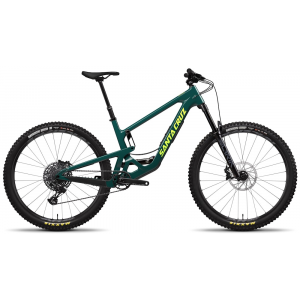
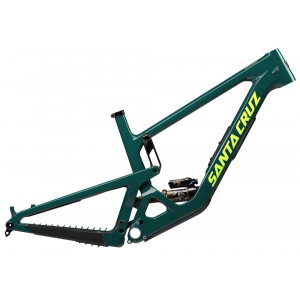
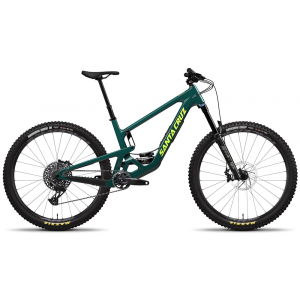
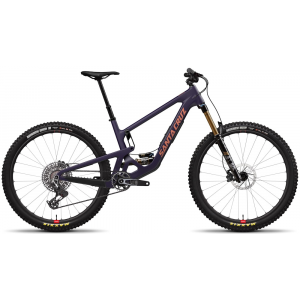
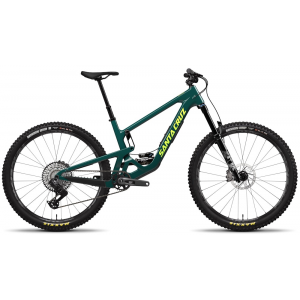
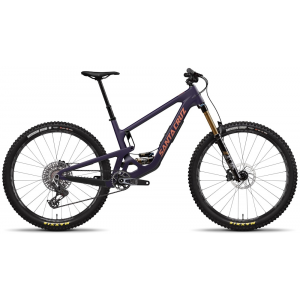
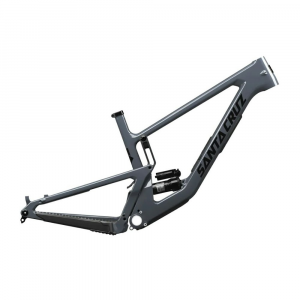
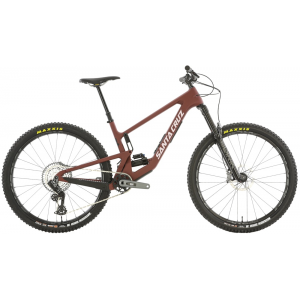




















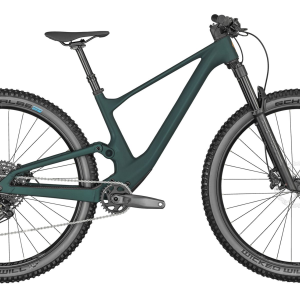
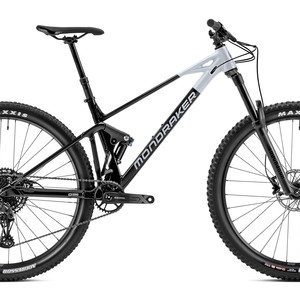
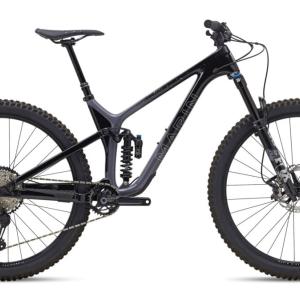
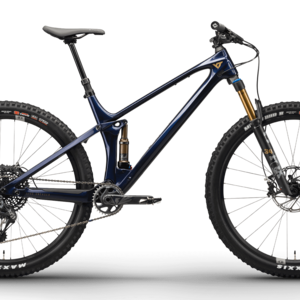
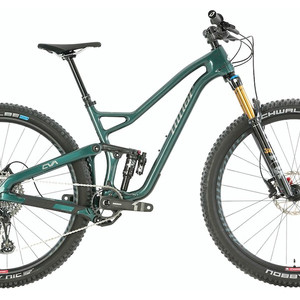
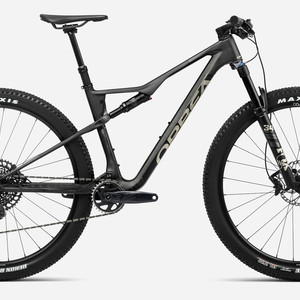










8 comments
Post a reply to: Review - 2017 Santa Cruz Hightower from Vital MTB Test Sessions